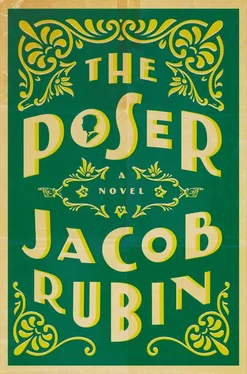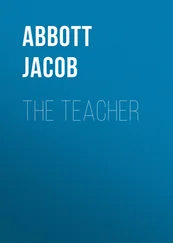Max tossed the last knot of pretzel to the assembling pigeons. “We’ll need to give Bernard notice, though, if we’re changing it. For the marquee, of course.”
“Who’s that Lucy?”
“Of course it could all go to shit quickly if — Lucy?”
“The woman at the Communiqué.”
“Ah!” He draped his arm around the back of the bench. “Lucy Starlight. A real character, I’ll tell you that. Lounge singer. On the scene for years.”
“Character?”
“Let’s just say she is — how to put it? — a friend to man .”
I tried not to react visibly.
“Not that that’s a bad thing. No, sir! Some men would toss dirty words at a woman like that — scared men, boys really. There’s much saint in a slut, boy. Remember it.”
“She with Bernard?”
“Oh, I doubt it. Possible, I suppose, but—” Max stopped and looked at me. He had a queer expression on his face. “Does the genius have a crush ?”
“Not in the slightest,” I said.
Since he winked, nudged my shoulder cartoonishly, and then said “O-kay,” I don’t think Max believed me, but he didn’t press the matter further.
It didn’t feel like a crush, I knew that. The world was a smooth case, Lucy a splinter jutting out of it. I’d mentioned her in the letter I wrote Mama. It was the first letter I’d ever composed, and I was shocked by the freedom of it. I could throw the words on the page and not have to stand by them.
SEPTEMBER 29
My Mama,
It was slow going at first, but it seems we’ve gotten our first bite. Your little ape, Giovanni Bernini, will be making his stage debut on October 2nd at the Communiqué (There’s a notice in the Gazette. Perhaps there’s a copy at the library?). The City is a parade of faces, Mama, and I do think I was meant to witness it. A City of threads! I’ve even met a woman I can’t imitate — I say it cavalierly, here, but it’s made me fairly nervous, as you might imagine. Only you can imagine it, I know. You’ll have to come down here and help straighten it out. Visit soon, Mama.
With love,
Giovanni
The caricaturist penned a final eyelash, completing the vision. He had tossed the thing off quickly, competently. The pink bolls in her cheeks, the fine curling eyelashes: If the girl had been born a cartoon, it would be what now appeared on his easel. Seeing the final result, the mother loosened her mouth. A grin startled her cheeks. This street man, entrusted with her daughter’s face, hadn’t attempted a crime, and she could now relax. He squinted at the drawing, plucked it from its wooden hold, and handed it to the girl. She readied herself for the unveiling, held it wide in her hands. She stared and stared at it. Her smile did not get bigger or smaller. Only children can be let down that way, invisibly, before time has taught them a measure of expectation. Rejuvenated, the mother tiptoed around the cobble and rubbed her daughter’s shoulders, confirming the experience had been a success.
“World’s Greatest!” Maximilian exclaimed out of nowhere. “Giovanni Bernini, the World’s Greatest Impressionist!”
From the network of rafters above to the stage below, the comedian’s shadow stretched like a jinni out of its bottle. “Y’know, my wife and I. We’ve been married for ten years — I think it’s ten, right, Doris?” The comedian in his rumpled velvet suit turned to the wing where Max and I stood. “Doris, is it ten or twelve? Doris! Oh, Jesus. Asking how long you’ve been married — that’s like diggin’ up a grave and askin’ the corpse how long he’s been buried.” The crowd groaned, a notice of pain somewhere between plea-for-help and war cry.
Pacing in the shadowed wings, Max and I could judge the audience’s size only by these spurts of noise. Glasses clinked. Chairs scraped against the floor. Voices rose—“Be funny!” “Get off!”—like sea-thrown bodies, surfacing for a moment before sinking again into the black depths.
“Don Q., more like Don eewww ,” Max said, pacing. All day he had been anxious. That afternoon when one of the microphones kept emitting feedback, Max, in a huff, referred to one of the stagehands as a “pig’s heart.”
“My wife, she’s quite a doll.” Don Q. scratched the side of his head. “I mean, literally, she’s a doll. I bought her at the toy shop on Sixty-third Street and I tell ya, I got no complaints.”
His shadow extended its arm like a dancer at the end of a routine.
“My wife — when we get home, we’re in bed, and she says to me, ‘C’mon, baby. It’s been so long since we made love.’” His shadow, the second comedian, gave the line a real what-the-hell-can-I-do oomph, and the most absurd picture came to me: of the lanky shadow in bed next to a bewildered woman tugging the sheets up to her neck. “‘C’mon, let’s make it a special night, honey,’ she’s saying to me. ‘When we were young, we did it all the time. C’mon, make love to me,’ she says. So I tell her, ‘Baby, I already did . You didn’t notice?’”
He was an excellent comedian, the shadow. He made the circumstances so unamusing that one had to laugh.
“You find this trash funny ?” Max asked.
Just then we heard Don Q. say, “Thanks, baby. Thank you!” A thin bouquet of applause was tossed at the stage. He exited through the far wing, the shadow behind him distending, then collapsing, like an umbrella.
The spotlight beamed upon the microphone, not ten feet from us. It seemed music should be playing. Music should be playing. There was a palpable vacuum of entertainment, the kind of parlous lull that required music, that could only be cured with music, yet no music played. The crowd, already testy, grabbed on to the kindling of silence until a conflagration of talk, shouting even, flared up in the hall.
“Where is he?” Max ragefully pulled the ears of his bow tie. We wore tuxes (cummerbunds, bow ties, wingtips), rented from a tailor Bernard knew in the Garment District. “Where the goddamn is he?” We were under strict orders not to move until the stage manager found us. This had been the principal lesson of the sound check.
Footsteps seemed to imply milling.
With a swift waddling motion, like a man with pants around his ankles, Max hurried to peek around the proscenium. He rushed back. “People are leaving, goddamnit.” The illuminated microphone was not ten feet from us. “In five minutes we go onstage no matter what.” Then he said, “Right now. Ready?” and, with no warning, nudged me onto the stage.
The instant I stepped out, a spotlight found me, like a prison’s searchlight locating an escaped inmate — too bright for me to see the audience. Max soon joined me onstage and, in his own spotlight, took long, butlerish steps to the microphone, a few paces to my right. I clasped my hands behind my back and stared at the circle of illuminated wood at my feet. This was the plan. Before an imitation, I was to appear like a wind-up toy not yet wound: arms clasped behind my back, head bowed. When a volunteer came to the stage, I was to spring to life.
“Ladies and Gentlemen… Ecchem…” The sound of Max clearing his throat was grandly amplified. “Hello-OOOO — ANAEEEENNANENANA!”
The feedback shrieked, leaving in its wake a series of gasps.
“My… my…” Max’s voice sounded meek, of all things, now that it commanded the hall. “My apologies. Perhaps I should have asked the microphone for a date before approaching it so rudely?” From the crease in his voice, I could tell he was smiling, but the crowd had disintegrated from a unified audience to factions of conversation.
Читать дальше












